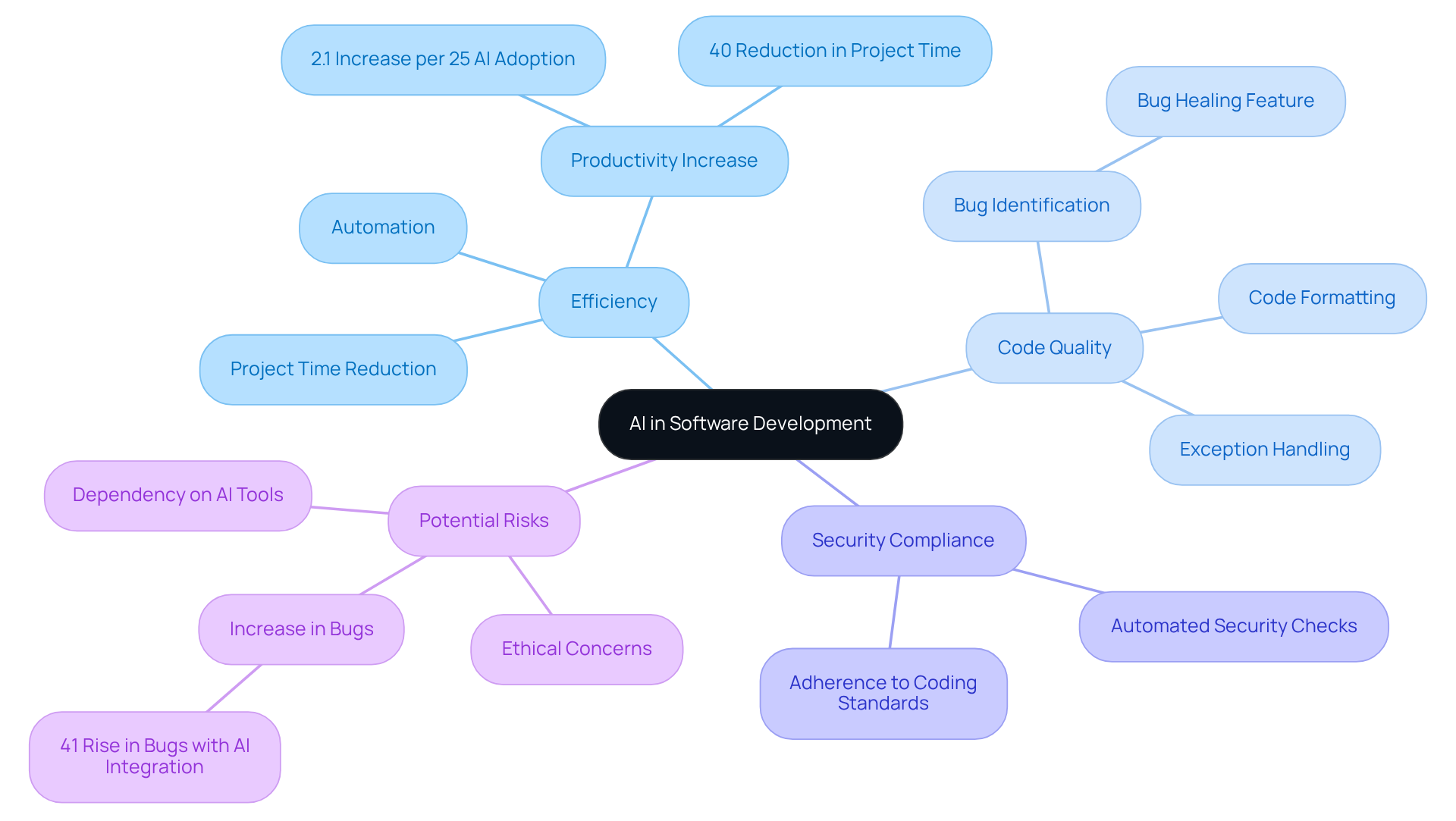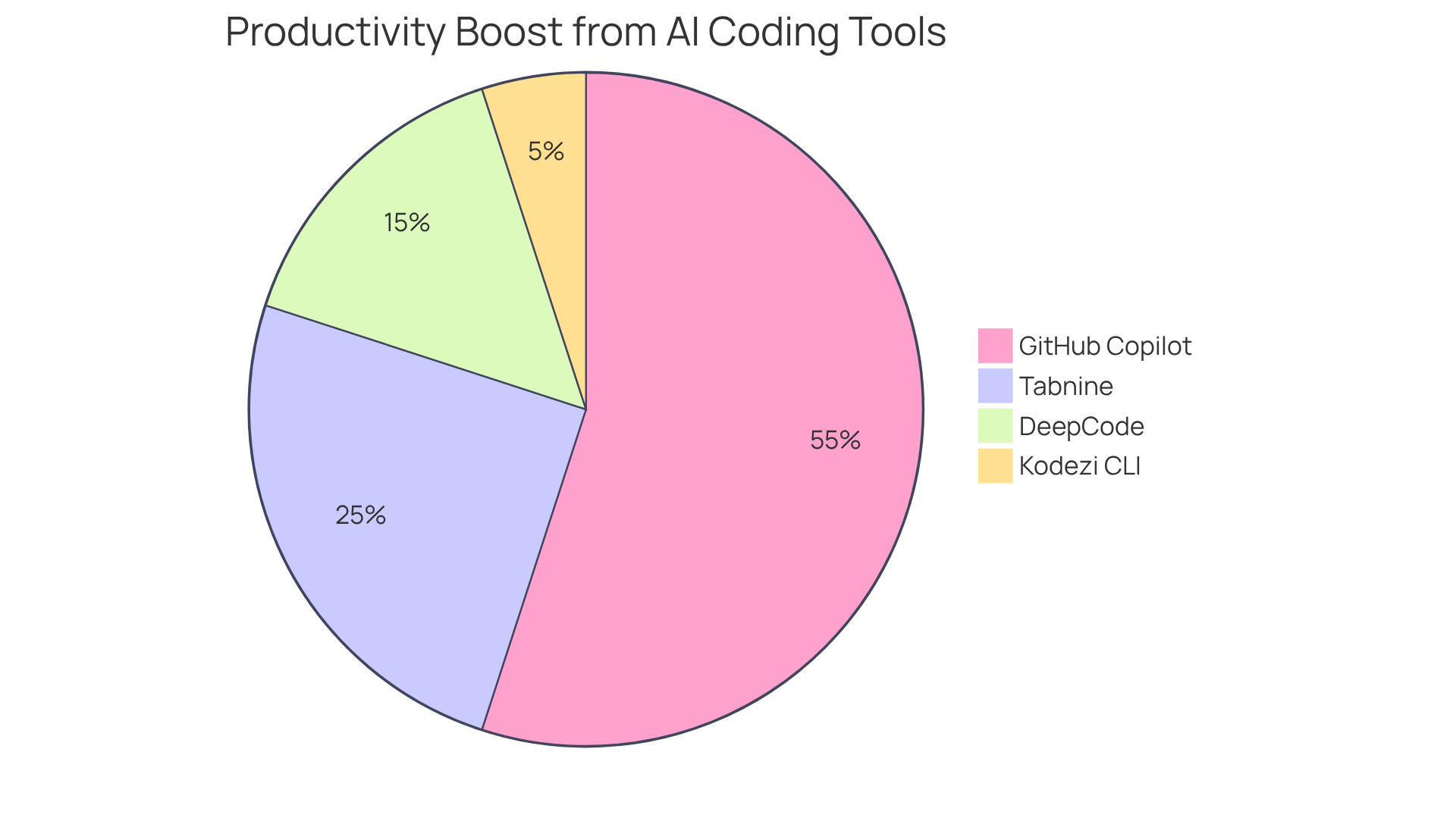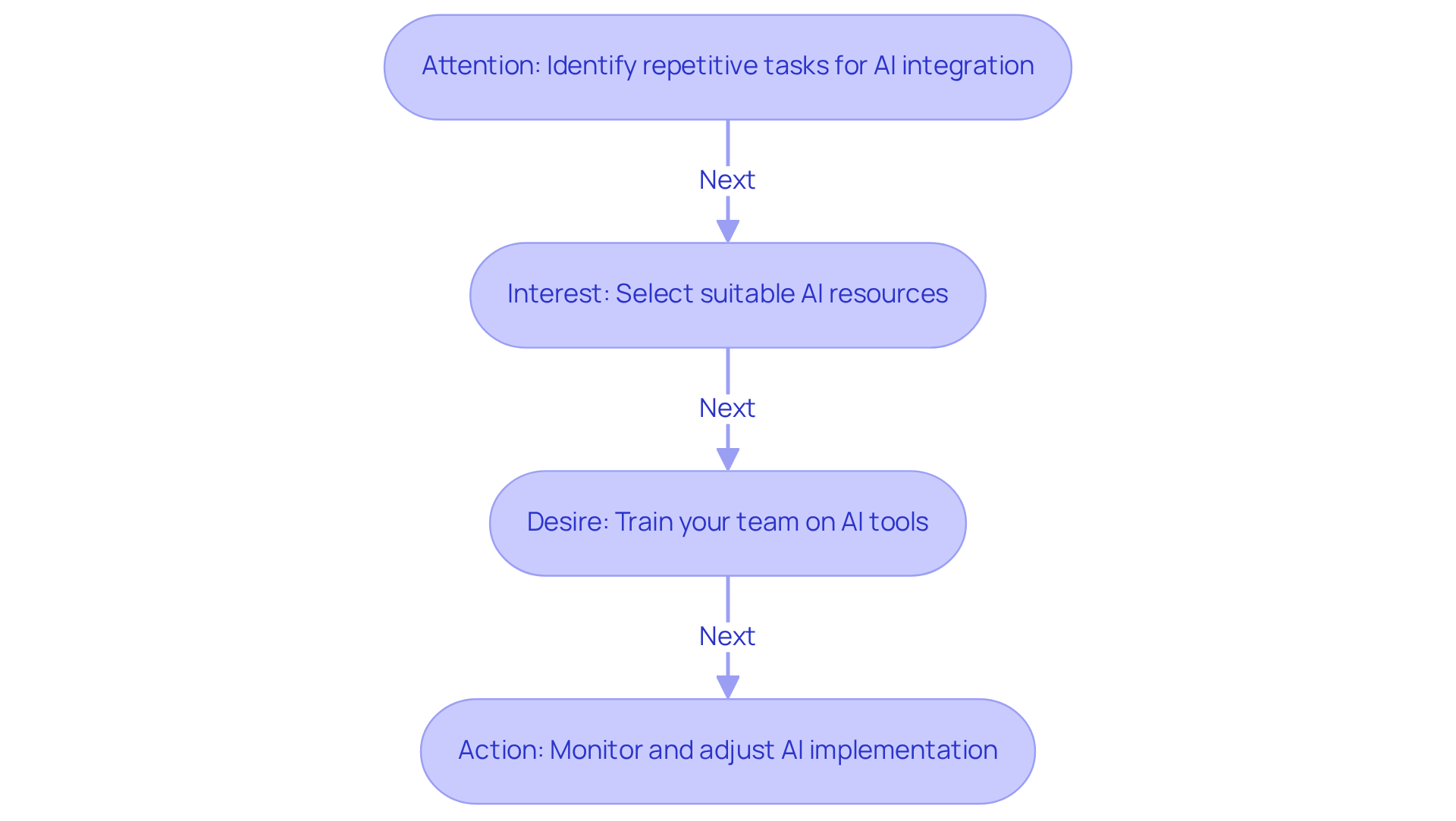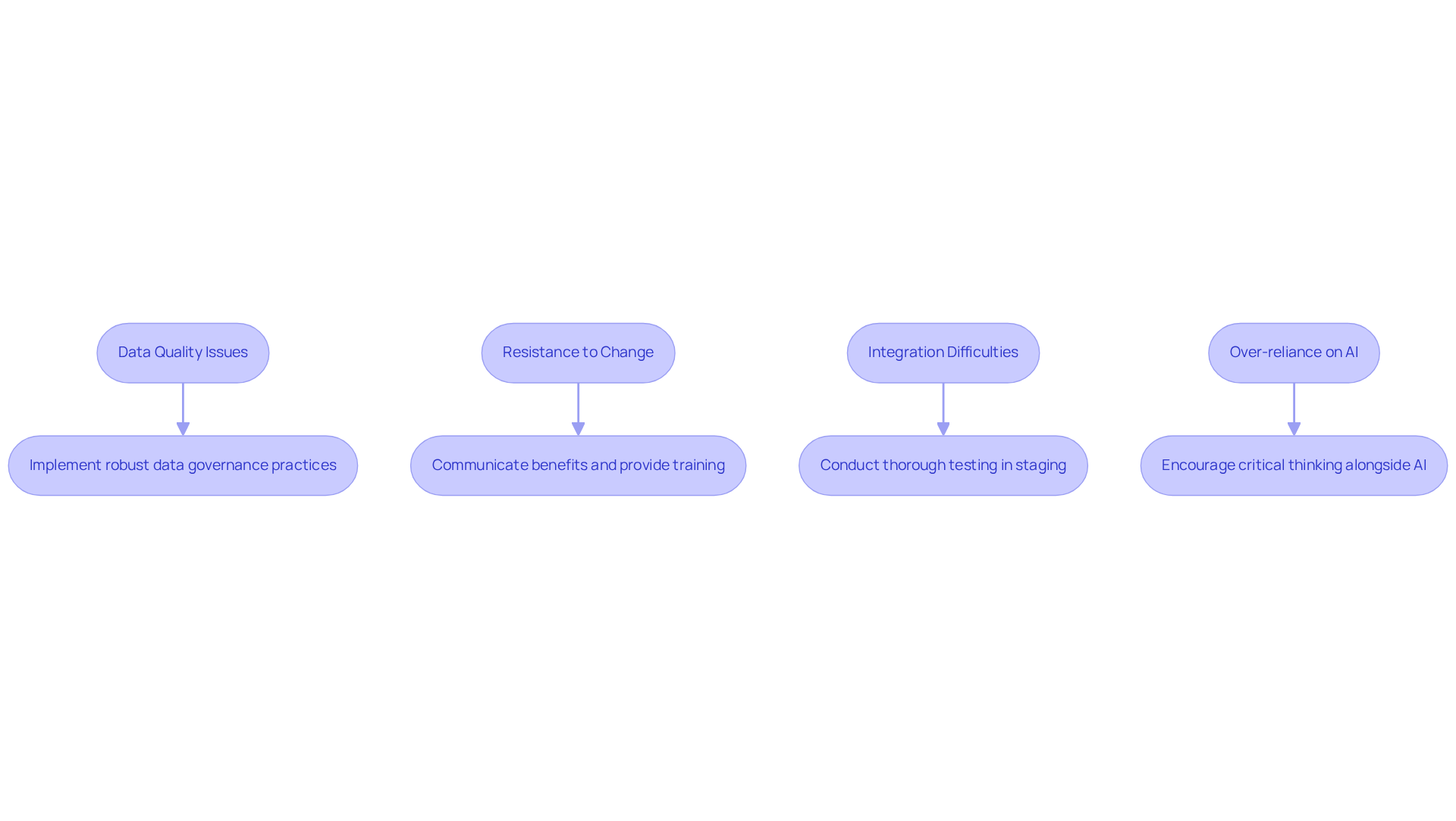Overview
Developers often encounter significant challenges in coding, particularly when it comes to managing repetitive tasks. How can these obstacles be effectively addressed? Kodezi offers innovative solutions that streamline development processes. By automating tasks like debugging and code reviews, tools such as Kodezi CLI and GitHub Copilot not only enhance productivity but also improve code quality.
Imagine a scenario where developers can focus more on innovation rather than getting bogged down by mundane tasks. This is where Kodezi shines. Its features are designed to alleviate the frustrations associated with repetitive coding activities, allowing teams to work more efficiently. Furthermore, by integrating these AI tools, developers can tackle potential challenges related to data quality and team resistance head-on.
The benefits of using Kodezi are clear: improved productivity and enhanced code quality. As teams adopt these tools, they can experience a significant shift in their workflow dynamics, leading to better outcomes and faster project completions. In addition, continuous monitoring of the integration process ensures that teams can adapt and optimize their use of AI effectively.
Are you ready to explore the tools available on the Kodezi platform? By leveraging these resources, developers can transform their coding practices and embrace a future where innovation takes center stage.
Introduction
The rapid evolution of artificial intelligence is reshaping the landscape of software development, presenting both opportunities and challenges for developers. In the face of common coding challenges, how can developers effectively harness AI to improve their workflows while maintaining high standards of code quality?
As companies increasingly adopt AI tools, the potential to streamline coding processes and enhance productivity becomes clearer. Kodezi addresses these challenges with specific features designed to simplify integration and reduce the risk of new bugs. Furthermore, the promise of efficiency is complemented by tools that empower development teams to navigate this transformative journey.
By exploring Kodezi, developers can unlock improved productivity and code quality, ultimately leading to a more efficient development process. This article delves into practical steps and essential tools that can help you make the most of AI in your coding practices.
Understand the Role of AI in Development
Coding challenges can be daunting for developers, often leading to inefficiencies and quality issues. However, AI is transforming software creation as it helps to streamline development by automating repetitive tasks and significantly enhancing programming quality. Kodezi CLI addresses these challenges by independently identifying bugs and resolving them before reaching production, ensuring that software quality is upheld and performance bottlenecks are tackled promptly.
Furthermore, Kodezi enhances security compliance by adhering to the latest coding standards, optimizing code formatting, and adding exception handling where necessary. In fact, over 60% of software creation companies are now utilizing AI in some capacity. This reflects a growing reliance on these technologies, as they help to streamline development to boost productivity and maintain high-quality codebases. Real-world applications, such as Kodezi, demonstrate how AI can streamline development by autonomously monitoring and healing codebases through features like bug healing and test healing, ensuring they remain clean and production-ready.
In addition, this integration of AI streamlines development not only enhances efficiency, with companies reporting up to a 40% decrease in project time, but also allows teams to focus on innovation and strategic growth. However, it is crucial to stay informed about potential risks. AI integration can lead to a 41% rise in bugs, necessitating careful oversight of AI resources. Are you ready to explore the tools available on the Kodezi platform and enhance your coding practices?

Explore AI Tools for Streamlining Development
Developers often face significant challenges in coding, from managing technical debt to ensuring code quality. Fortunately, numerous AI applications have been created to streamline development processes, with each offering distinctive features that boost productivity. One standout solution is Kodezi CLI, an autonomous tool that excels in managing codebase maintenance. By automating debugging, test healing, and documentation updates, Kodezi CLI consistently observes software repositories, which helps streamline development by addressing problems as they arise. This proactive approach greatly decreases technical debt and enhances code quality. Developers benefit from detailed explanations and insights into codebase issues, ensuring they understand what went wrong and how it was resolved.
Furthermore, Kodezi CLI's essential characteristics include automated debugging, performance enhancement, and security adherence, guaranteeing that codebases remain tidy and compliant over time. To get started, users can take advantage of the "Get Started for Free" option or request a demo to see Kodezi CLI in action.
In addition to Kodezi CLI, GitHub Copilot serves as an AI-driven completion assistant that proposes context-aware snippets and functions. This tool allows developers to program more swiftly and with enhanced precision. Organizations utilizing GitHub Copilot report an impressive 55% increase in developer productivity, demonstrating how streamline development leads to a 31% reduction in time spent on standard programming tasks.
Similarly, Tabnine is an AI-powered coding completion application that anticipates and recommends programming as developers type, further enhancing development speed and precision. Its lightweight integration with various IDEs allows for seamless adoption into existing workflows.
Moreover, DeepCode is an AI-driven application for reviewing software, examining programs for potential bugs and security weaknesses. By automating the review process, it helps developers maintain high coding standards and compliance, ensuring greater reliability and safety in the system.
By exploring these tools, including Kodezi CLI, developers can leverage streamline development to identify which solutions best fit their workflows. Ultimately, this exploration enhances productivity and ensures cleaner, more maintainable code.

Implement AI Solutions in Your Development Workflow
To effectively implement AI solutions in your development workflow, consider the following steps:
-
Attention: Are repetitive tasks slowing down your coding process? Identifying key areas for AI integration can be the first step to streamline development and overcoming these challenges. Begin by evaluating your current development processes to pinpoint tasks that are suitable for automation. Focus on areas such as code reviews, testing, and documentation updates, which can significantly benefit from AI intervention.
-
Interest: Once you've identified these areas, the next step is to select suitable AI resources. Choose AI tools that align with your specific needs based on your evaluation. For instance, if bug detection is a critical concern, solutions like Kodezi can autonomously monitor and resolve issues, ensuring your codebase remains clean and compliant.
-
Desire: After selecting the right tools, it's essential to train your team. Provide your development team with the essential knowledge to use the chosen resources effectively. Conduct training sessions that address the features of the AI applications and optimal methods for their incorporation into daily workflows. By doing so, you empower your team to leverage these tools for improved productivity and code quality.
-
Action: Finally, after implementation, continuously monitor and adjust your approach. Track the performance of the AI resources and solicit feedback from your team to identify any challenges they face. Make adjustments as needed to optimize their usage. Research indicates that organizations utilizing AI resources can experience a 2.1% increase in productivity for every 25% rise in usage, highlighting the potential advantages of this integration. By following these steps, you can streamline development and seamlessly integrate AI into your programming workflow, enhancing both efficiency and code quality.

Troubleshoot Common Challenges in AI Integration
Integrating AI into your development workflow can present several challenges, particularly in the realm of coding. Developers often grapple with issues that can hinder productivity and code quality. However, Kodezi offers solutions that can effectively address these challenges.
Data Quality Issues: AI tools depend heavily on high-quality data. To facilitate effective AI analysis, ensure that your codebase is clean, well-documented, and free from errors. Did you know that poor data quality can lead to significant losses? Organizations face average annual losses of $12.9 million due to inadequate data management. Implementing robust data governance practices is essential for maintaining data integrity. Kodezi's AI-driven programming solution can assist by automatically analyzing, correcting, optimizing, and generating comments on your code, ensuring that your codebase remains optimal for AI analysis.
Resistance to Change: Team members may be reluctant to embrace new resources, often due to worries about their effectiveness or the learning curve involved. How can you address this? Clearly communicate the benefits of AI, such as increased efficiency and reduced manual workload. Providing comprehensive training and support can help alleviate fears and foster a culture of innovation. Notably, over half of senior decision-makers cite a lack of skilled personnel as a barrier to effective AI model building, highlighting the need for targeted training initiatives. Kodezi’s user-friendly interface and comprehensive support documentation can facilitate this transition for teams.
Integration Difficulties: Some AI applications may not seamlessly merge with existing systems, leading to disruptions in workflow. To mitigate this risk, conduct thorough testing in a staging environment before full deployment. This allows you to identify compatibility issues and make necessary adjustments, ensuring a smoother transition. Kodezi CLI, designed for B2B engineering teams, autonomously improves codebases and fixes bugs before they reach production, significantly reducing integration challenges.
Over-reliance on AI: While AI can significantly enhance productivity, it should not replace critical thinking or human oversight. Encourage your team to view AI as a supportive tool rather than a substitute for their expertise. This balance is essential for upholding high standards of quality and innovation in your creation processes. Kodezi’s capabilities in automatic bug analysis and code correction can serve as a valuable resource, allowing developers to focus on more complex problem-solving tasks.
By proactively addressing these challenges and implementing effective strategies, you can ensure that AI streamline development is successfully integrated into your workflows. Explore the tools available on the Kodezi platform to enhance your coding experience.

Conclusion
The integration of AI into development processes addresses significant coding challenges that developers face today. Tools like Kodezi CLI automate repetitive tasks and tackle coding issues, allowing teams to streamline their development efforts. By leveraging these automated solutions, developers can focus on innovation and strategic growth, ultimately enhancing productivity and code quality. As organizations increasingly adopt AI technologies, the potential for improved coding practices and reduced project timelines becomes evident.
Furthermore, key insights throughout the article highlight the transformative role of AI in development. From understanding its benefits, such as automated debugging and security compliance, to exploring practical tools like GitHub Copilot and Tabnine, the discussion emphasizes how these resources can lead to substantial gains in developer productivity. Implementing AI solutions requires thoughtful consideration of existing workflows, training for team members, and ongoing monitoring to ensure optimal performance.
In addition, the successful integration of AI into development workflows is not merely a trend but a necessity for modern software engineering. By embracing these technologies, developers can navigate common challenges and unlock new levels of efficiency and code quality. As the landscape of software development evolves, exploring AI tools and fostering a culture of innovation will be crucial for teams aiming to stay ahead in an increasingly competitive environment. What steps will you take to integrate AI into your development processes?
Frequently Asked Questions
What role does AI play in software development?
AI helps streamline software development by automating repetitive tasks, identifying and resolving bugs before production, and enhancing programming quality.
How does Kodezi CLI contribute to software quality?
Kodezi CLI independently identifies and fixes bugs, ensuring software quality is maintained and performance bottlenecks are addressed promptly.
What security compliance benefits does Kodezi offer?
Kodezi enhances security compliance by adhering to the latest coding standards, optimizing code formatting, and adding exception handling where necessary.
What percentage of software creation companies are utilizing AI?
Over 60% of software creation companies are now utilizing AI in some capacity.
How does AI integration affect project time and team focus?
AI integration can lead to up to a 40% decrease in project time, allowing teams to focus more on innovation and strategic growth.
What risks are associated with AI integration in development?
AI integration can lead to a 41% rise in bugs, which necessitates careful oversight of AI resources.
What features does Kodezi offer to streamline development?
Kodezi offers features like bug healing and test healing to autonomously monitor and maintain clean, production-ready codebases.




